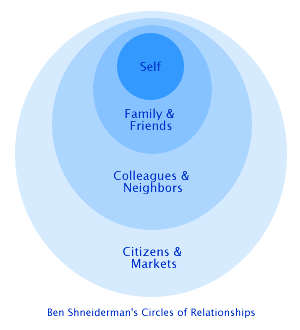June 29th
You can’t be social by yourself
Found a great explanation of social design from Crysta Metcalf of Motorola, who is currently involved in an ethnographic research project to find out how people communicate through technology: (via experientia)
‘When we talk about the “user experience” the main emphasis is often on an individual’s experience with a particular technology. Even with a purported social technology, for example a social networking site, we still tend to create for the individual’s interaction with the site (how does someone find their friend, how do they access this site easily from a mobile device).
However, designing for sociability means thinking about how people experience each other through the technological medium, not just thinking about how they experience the technology. The emphasis is on the human-to-human relationship, not the human-to-technology relationship. This is a crucial difference in design focus. It means designing for an experience between people.
Continue Reading: You can’t be social by yourself
